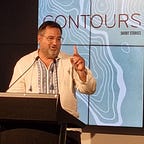What Can Be Learned From Crashing Your Bike and Falling On Your Head
I took a tumble this weekend.
Ass over tit, as they say. Head over heels.
Specifically, a young kid somehow crossed over into the opposite lane and we had a big bicycle bingle. I first flew into my handlebars, and then up and over them into a perfect two-point landing. The two points being by my brain bucket (or bike helmet) and my right hand.
And that isn’t elegant when you’re built like a 120 kilogram rugby prop and not like Richie Porte (an Australian cycling champion).
After briefly blacking out and then coming to on the bicycle path, I had some presence of mind to ask the very frightened pre-teen who I’d t-boned if he was okay. Thankfully, I think he was, and his apologetic nice-guy dad seemed to think so too.
Presence of mind. An interesting phrase. To be attuned to a situation. To be conscious of one’s immediate surrounds.
And, besides that bit of asking the kid about his well-being, I showed absolutely zero of it for the rest of the episode and day.
In fact, I provide a classic example of doing everything wrong in a situation where one unexpectedly falls — and fails.
After the crash, I got up and, having checked my bike more than myself, I quickly started to peddle away from the scene. Rather than being present with the accident and its aftermath, and showing myself the right self-care and common sense, I practiced three dumb “D’s”: denial, distraction, and deflection.
Denial. It’s extraordinary the degree to which many of us are socially and parentally conditioned to deny reality around ourselves and ‘just get back on your bike’. In my case, that’s what I literally did (!) and cycled another 20 kilometres to a footy match at Henson Park in Marrickville. I disregarded stuff my body was feeling and showing, including scrapes, bruises and soreness, as if nothing happened. Dumb.
Distraction. We tell ourselves to ‘think of something else’ or change our context. Mine was watching my Newtown Jets — and very rapidly sucking down four tinnies of Resch’s “silver bullet”. It’s precisely not that when you’ve hit the deck both physically and psychologically. Self-medication is almost always self-sabotage. Dumber.
Deflection. Given the opportunity to real feel something — like ‘that hurt’ and ‘listen to your body’ — we often respond with flight. It’s somehow too hard to just be with the pain and let it happen. Instead, the mind plays the “time-travel trick”. Mine said past-tense things like ‘what if I had just hit the brakes harder’ or future-tense things like ‘maybe, I should stop riding’. Basically, those are delusions designed to avoid the immediate reality. Dumbest.
So, maybe you’re thinking ‘yeah so what — no harm no foul.’ Nope unfortunately.
I’m not playing for your sympathy by letting you know that by evening I was really disoriented and had an intense headache coming on. Lady Suzanne had to pick me up from somewhere stranded in Strathfield. By the next morning, I was having trouble even lying in bed without serious head pain, and it was pretty obvious that I had some combination of concussion and shock. I was TKO’d.
It took being immobilised for my ego to let go and accept the prang and the present for what they were rather than what I forced them to be. My Rambo strategies kicked me in the ass.
I’m all good now after imposed rest, but what might have been an alternative approach? A smarter and compassionate approach that didn’t see me add to my body’s and my soul’s trauma?
First, I could have found the “pause” button at the scene of the accident. By just slowing down and being still with my surrounds, I could have connected better with the scared kid and his well-meaning father. We could have truly checked in with each other in a shared human moment. We crashed into each other for some broader reason that should probably not be wilfully ignored. A random event could have become a relationship — and I could now also be more confident about the kid’s well-being.
Making the moment is a great predictor of what comes next.
Second, in my Ukrainian Catholic faith, it’s still the Easter season and there’s a relevant reminder. That is: pain is part of life and it is necessary. It’s in moments of suffering that grace is often entwined and awakened, if we are patient and poised enough to look. Or, as the theologian I most admire, Father Daniel J. O’Leary, suggests: while it threatens our comfort, ‘the pain of Good Friday will forever keep before us that life is truly experienced in the darkest, meanest mud and muck of things.’
Like death, divorces, disasters, debt, disloyalty… and bike blunders.
